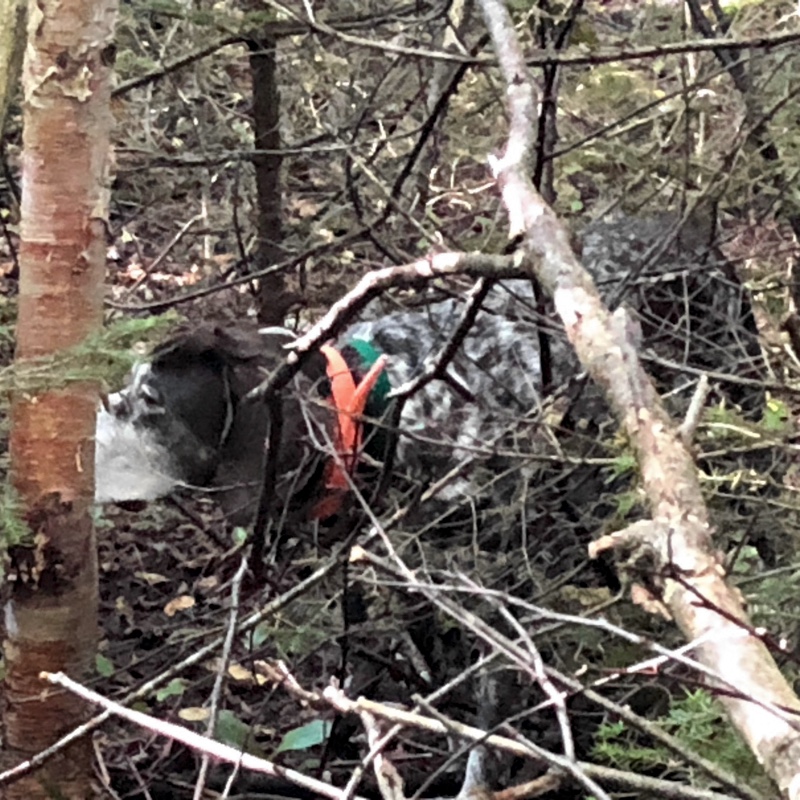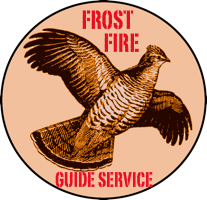
Progress
Millie
While Monty hasn't been out in the woods too much this summer, in an attempt to preserve him for some hunting this fall, the other dogs have been out pretty consistently when conditions allow. Receiving the most attention is Millie, Rosie's sister from the same litter, as we try to get her up to speed for hunting this fall. While she is the same age and has the same breeding as Rosie, she hasn't had much formal bird dog training, so she has been my "summer project". Much like a puppy in its first season of training, I have taken it slowly with her to build a successful foundation for her to become a bird dog.
We did a lot of yard work early on to establish trust and compliance - recalling, whoa training, and general obedience work was our focus. It's all paying off now, as Millie has been a pleasure to handle out in the woods (she's conditioned to the recall button on our training collar), and has been dependably following the "whoa" command whenever given. Her range is generally good, though she has a tendency to get out a little bit if not monitored. A couple recall beeps from the training collar has her coming back within range quickly however.
She was also very tentative on her first trips in to the grouse woods early this summer, but that is all gone now. She shows good energy and plenty of confidence as she casts back and forth in her search for birds. All that has been great, but as some of you know, the major sticking point in Millie's development has been her lack of pointing. Yes, that's pretty important for a pointing dog, and while commands and cooperation are all well and good, there is no covering up for a pointing dog that doesn't point. There's no doubt that she smelled the birds, but she hadn't been stopping on them ... until this morning.
Perhaps the lightbulb came on for her today, as Millie had several good points during her run. The first was on a tight sitting woodcock - her bell went silent, the beeper collar came on (another crucial item to get conditioned to - the sudden sound from a beeper collar can scare a dog not properly conditioned to it), I gave her a "whoa" and moved towards her. She didn't move when it literally flushed at my feet, and still didn't move when firing the starters pistol. Her body "language" was telling too - staunch, intense, and tail straight up in the air, there was little doubt that she got a snout full of that bird's scent.
A little later on, she pointed a pair of quickly fleeing grouse, then had a staunch point on another pair a few minutes later. Making a commitment to keep her closer today in an effort to more easily observe her moving through the woods (easier said than done), she contacted her birds closer, and all of these points would have offered shots had it been a hunting situation. Needless to say, there was lots of positive reinforcement for Millie after each of her successes. Hopefully we can reinforce the progress that she's made over these next three weeks.
The Birds
Now, the information that you really want: what are the bird numbers looking like for this fall? I would say that it looks good, probably similar to the last couple of autumns that we've had. I'm no expert, but in general we've been moving some birds each time we've been out, but some sessions are better than others. This could be a result of the location that we're in or which dog is running, or just scenting conditions in general.
Here's a synopsis of our last three mornings of scouting:
Wednesday (NH): 9 / 10 grouse and 2 woodcock moved in about 2.5 hours. Rosie pointed two woodcock together, then pointed a brood of four or five grouse in limited time in the woods. Bode stopped to flush on another brood of four or five grouse in about a half hour, and hunted hard. Millie got the most work that morning but only had one moment where she was legitimately "birdy" - a spot where we traditionally see a grouse or two, but alas, nothing was there. 2.5 hours, 11 - 12 birds moved.
Thursday (VT): Heavy rain the night before and sporadic showers made the woods a tropical rainforest. Millie ran for about an hour and fifteen minutes and busted one grouse in her time. Not great results, but perhaps the grouse were still in the heaviest cover, staying out of the wet conditions. Bode then got a 45 minute run and stopped to flush on a small brood of three grouse. He held through the flushes and starters pistol shots, and hunted with good energy. 2.0 hours, 4 grouse moved.
Friday (VT): Millie's run, which is detailed above, lasted nearly two hours, and resulted in five grouse and one woodcock moved. Monty ran for thirty minutes or so and he contacted two single grouse, each of which decided it was better to flush than sit for a point. 2.5 hours, 8 birds moved.
Not earth shattering numbers by any means, but many of the grouse broods are still together, so it can be true "feast or famine" out there prior to the dispersal of the young birds. We'll be at it pretty hard over the next few weeks scouting our tried and true spots and looking for new ones as well.
Unsolicited Advice ...
One piece of advice for next month if you're coming up to hunt: bring rubber boots. While the rest of New England is in a major drought, northern New Hampshire and Vermont definitely are not! The grouse woods are very wet right now, with standing water in many places that usually don't have any. Nearly every skidder tire rut encountered around the logging cuts is water logged, so rubber boots are advised.
